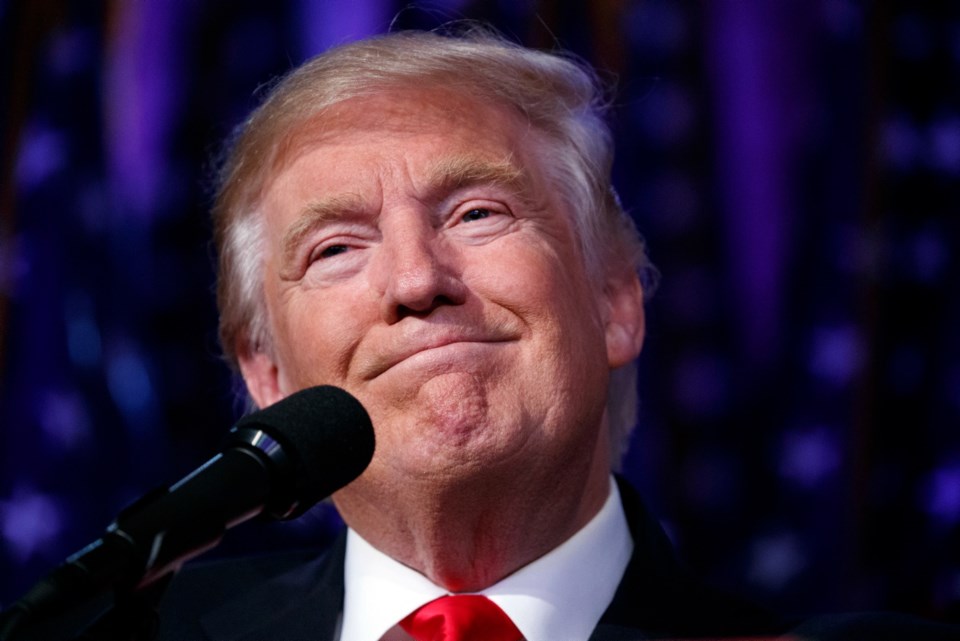Donald Trump’s threats to rip up trade agreements could be devastating to Canada, but could also send more tourists, professionals and students north, say business leaders.
His platform promises, including ripping up the North American Free Trade Agreement, which governs trade among the U.S., Canada and Mexico, hang in the air.
Saul Klein, dean of the Gustavson School of Business at the University of Victoria, said the Trump presidency could be devastating for Canada’s trade with the U.S.
Klein said soon after Trump takes office in January, he would expect the negotiating climate on trade files to take on a much darker tone — “our way or the highway.”
“He will appoint new trade representatives who will follow his marching orders,” said Klein.
That could mean trade negotiators taking a harder line during negotiations on a new softwood lumber agreement — asking if the deal is good for the U.S. and will it help protect American jobs.
The softwood lumber agreement, reached in 2006, expired more than a year ago. Negotiations to renew it are continuing as B.C., one of the world’s largest exporters of softwood lumber, tries to promote its wood products globally.
B.C. Premier Christy Clark took a diplomatic tone Wednesday, saying B.C., alongside the federal government, will work diligently to ensure “we protect and grow the relationship that is crucial to working families in our province on issues like free trade and a new softwood lumber agreement.” But, “I don’t know that softwood lumber is something that is particularly important to this new president,” she said.
On the issue of free trade, Clark urged calm and noted that Trump will have to work with Congress and state governors. “There’s lots of reason to be hopeful because there are still a lot of free traders in the United States who know that free trade with Canada has been great for their economy, too.”
Andrew Wynn-Williams, divisional vice-president, B.C. for the Canadian Manufacturers and Exporters, said Trump’s election is unnerving, but “we have to look past the rhetoric and take a measured response.”
About 50 per cent of B.C.’s trade is with the U.S. and it’s higher for the rest of Canada, said Wynn-Williams. Realistically, the president-elect can’t make unilateral decisions on free trade deals, he said. “It’s a very complex agreement and it would be very difficult to undermine it in any way.”
The association wants the Canadian and provincial governments to reach out to America and stress how the manufacturers’ trade relationship is unique.
“We don’t just sell them stuff, we actually make stuff together, so there’s a lot of cross-border companies that work closely together rather than competing with each other,” said Wynn-Williams. “Our relationship is different and we have to make sure they know that.”
Klein believes the new America-first business climate could mean American firms think twice about setting up or expanding Canadian offices, while Canadian firms may consider moving to the U.S. sooner.
“Locally that may have an impact on high-tech firms,” he said, noting most of them do not cater to the Island market, but rather are here to serve the massive American audience.
Dan Gunn, executive director of the Victoria Innovation, Advanced Technology and Entrepreneurship Council, warned it’s important to watch if Trump’s campaign rhetoric becomes reality.
“The president-elect has talked about changing trade agreements and a great deal of our companies export to the United States,” said Gunn. “
So we also have to watch the impact on their business and what that might look like.”
On the flip side, there may be opportunities for Victoria tech companies to scoop up talent from Silicon Valley or draw back Canadians who were recruited to the U.S., he said.
Gunn said highly skilled workers from around the world, particularly visible or religious minorities, who had set their sights on moving to the U.S. might look north instead.
“From the tech sector’s perspective, we want to make sure anybody who is thinking of coming here finds the easiest channels to make that a possibility,” Gunn said.
Klein agreed there is a potential economic upside to a Trump presidency. “I think we could see some positive spillover in tourism where people may be more reluctant to go to the U.S. if it is seen as less welcoming and more threatening.
“And on the education side, we may see stronger interest from international students in studying in Canada as opposed to the U.S.,” said Klein.
— With files from Katie DeRosa



